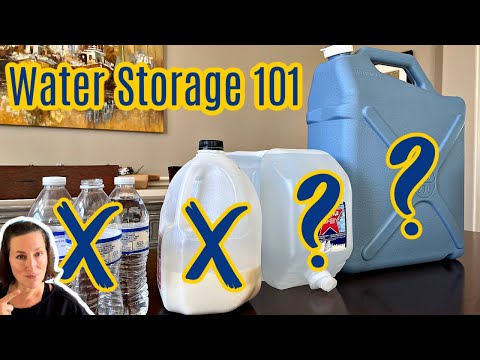Looking for creative and efficient ways to store your bottled water? Discover ingenious and space-saving solutions for keeping your hydration essentials organized and easily accessible. Bottled water storage ideas offers a plethora of innovative options to maximize your storage space while maintaining the freshness of your water supply. Whether you have limited countertop space, a small pantry, or a cramped refrigerator, our curated selection of storage solutions will inspire you to declutter and optimize your storage area. From stackable racks and adjustable shelves to compact dispensers and wall-mounted holders, you’ll find the perfect storage solution to fit your needs and lifestyle. Stay hydrated and organized with our water storage ideas that combine functionality and style, ensuring you always have refreshing water on hand when you need it. Explore our collection of bottled water storage ideas and transform your space into a clutter-free oasis today. Trust us to provide you with practical and creative storage solutions that will revolutionize the way you store and access your bottled water.

2023 Trending: 4 Best Ways to Store Water for an Emergency! Storing Water Long Term
| Storage Method | Description | Advantages | Disadvantages |
|---|---|---|---|
| Bottled Water | Storing water in commercially packaged bottles with tight-sealed caps. | – Convenient and readily available in stores – Easy to transport and distribute – Long shelf life |
– Requires ample storage space – Can be expensive for large quantities – Plastic bottles can degrade over time |
| Water Barrels | Using food-grade plastic barrels or drums to store large volumes of water. | – Can store a significant amount of water – Relatively affordable and durable – Can be reused for other purposes |
– Requires regular maintenance to prevent contamination – Bulky and heavy, making transportation difficult – Limited portability |
| Water Storage Tanks | Installing large water storage tanks, typically made of polyethylene or fiberglass, for long-term water storage. | – Provides ample water supply – Suitable for long-term storage – Can be easily integrated into existing plumbing systems |
– Requires professional installation – Expensive upfront cost – Requires space and may not be suitable for all households |
| Water Filtration Systems | Utilizing advanced filtration systems to purify and store water for emergencies. | – Ensures access to clean and safe drinking water – Can filter various contaminants – Long-lasting and reusable |
– Initial investment can be high – Requires regular maintenance and replacement of filters – Limited storage capacity |
“Quenching Emergency Thirst: 4 Top Tactics for Long-Term Water Storage!”
The Importance of Proper Bottled Water Storage
Bottled water has become a staple in many households, providing a convenient and portable source of hydration. However, it’s crucial to store bottled water correctly to ensure its freshness and safety. In this article, we will explore five compelling bottled water storage ideas that will help you keep your water supply in optimal condition.
1. Cool and Dark Storage Space
One of the most critical factors in preserving the quality of bottled water is to store it in a cool and dark environment. Exposing bottled water to direct sunlight or high temperatures can degrade the plastic bottles over time, leading to potential chemical leaching. Therefore, it’s best to choose a storage space that is away from direct sunlight and maintains a consistent cool temperature.
Consider utilizing a pantry or a dedicated storage shelf in a cool and dark corner of your home. If you don’t have a suitable indoor space, you can also store the bottles in a garage or basement, as long as the area remains consistently cool and doesn’t experience extreme temperature fluctuations.
2. Avoid Chemical Contamination
Another crucial aspect of bottled water storage is to avoid any potential chemical contamination. This includes keeping bottled water away from cleaning products, pesticides, or other chemicals that may be stored nearby. These substances can potentially leach into the water, compromising its safety and taste.
Ensure that your storage space is separate from any chemical storage areas, and avoid storing bottled water near potential sources of contamination. This includes areas where chemicals are used or stored, such as laundry rooms or garages. By taking these precautions, you can be confident that your bottled water remains pure and uncontaminated.
3. Rotate Your Supply Regularly
It’s important to stay mindful of the expiration dates on your bottled water and rotate your supply regularly. Although bottled water has a long shelf life, it’s still susceptible to degradation over time. By rotating your supply, you ensure that you always have fresh water available and minimize the risk of consuming expired or compromised bottles.
When you purchase new bottled water, place it behind the older ones to ensure that you use the older bottles first. This practice helps maintain a fresh and reliable water supply, giving you peace of mind that you’re consuming safe and quality water.
4. Consider Temperature Fluctuations
While it’s essential to store bottled water in a cool space, it’s also essential to consider temperature fluctuations. Extreme temperature changes can impact the integrity of the plastic bottles, potentially leading to leaks or other issues. Therefore, it’s crucial to choose a storage space that remains relatively stable in temperature.
Avoid storing bottled water near any appliances that emit heat, such as ovens, stoves, or heaters. Additionally, make sure to keep the bottles away from freezing temperatures, as this can cause them to crack or burst. By being mindful of temperature fluctuations, you can preserve the quality and safety of your bottled water.
5. Organize and Keep Track of Your Stock
Finally, it’s essential to keep your bottled water supply organized and keep track of it regularly. By maintaining a system, you can ensure that you always have an adequate amount of water on hand and avoid any unnecessary waste.
Consider using storage racks or shelves specifically designed for bottled water to keep everything organized. Label the bottles with the purchase or expiration date to easily identify the oldest bottles that need to be rotated. By implementing an organized system, you can maximize the freshness and longevity of your bottled water supply.
In conclusion, proper bottled water storage is essential to maintain the freshness, safety, and quality of your water supply. By following these bottled water storage ideas, you can ensure that your water remains uncontaminated and ready for consumption whenever you need it.
Bottled Water Storage Ideas
#WaterStorageSolutions #EmergencyWaterPrep



